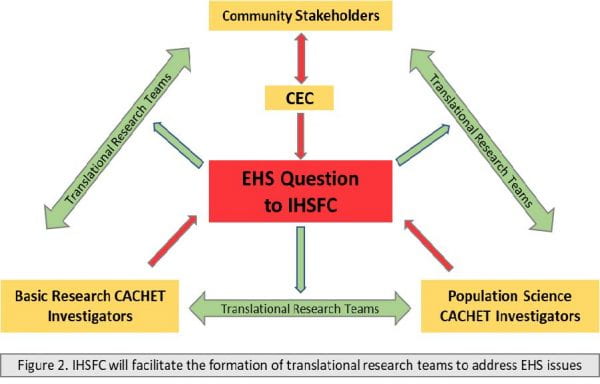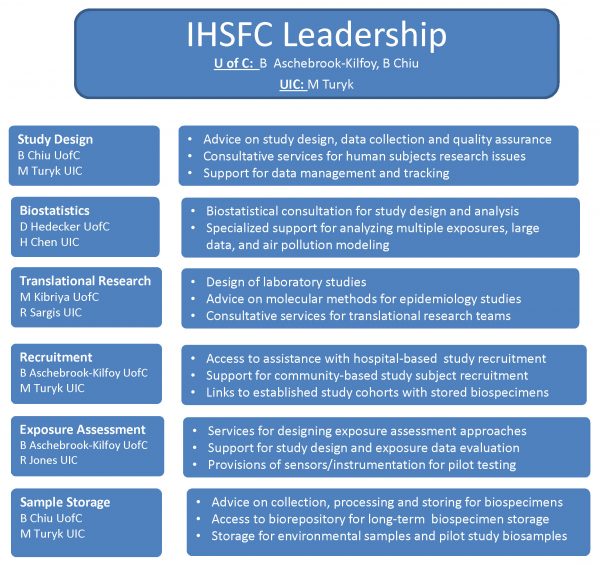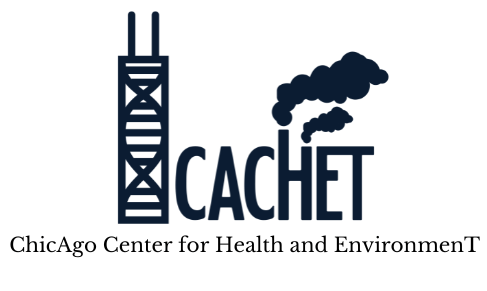Core Directors: Dr. Kristen Malecki (UIC) and Dr. Brisa Aschebrook-Kilfoy (UofC)
ABOUT The IHSFC provides CACHET investigators with necessary tools and methodologies to address environmental impacts on human health at both partner institutions. The IHSFC will play an important role in directing and supporting CACHETs overall translational research agenda in addition to supporting the work of individual investigators. In this context, relationship building and maintaining very active bi-directional communication will be key to ensuring the success of CACHET’s mission to mitigate environmental health related disparities in Chicago and beyond.
The IHSFC provides CACHET investigators with necessary tools and methodologies to address environmental impacts on human health at both partner institutions. The IHSFC will play an important role in directing and supporting CACHETs overall translational research agenda in addition to supporting the work of individual investigators. In this context, relationship building and maintaining very active bi-directional communication will be key to ensuring the success of CACHET’s mission to mitigate environmental health related disparities in Chicago and beyond.
One of the most important functions of the IHSFC is to support and enhance bi-directional translational research partnerships. As shown here, community stakeholders, basic research investigators and population health investigations contact the IHSFC for assistance in addressing EHS issues and the IHSFC facilitates the formation of translational research partnerships, development of study designs, and guidance on protocol implementation with the potential to promote environmental justice and minimize EHS disparity. In collaboration with the Community Outreach and Engagement Core, the IHSFC will facilitate interpretation and dissemination of environmental exposure and health data to communities and assist in translating community concerns into hypotheses that can be supported through the pilot project program.
Activities through which the IHSFC will promote translational research could include:
- Mapping of community environmental exposures and health conditions of concern
- Sponsor inter-institutional workshops to encourage parallel examination of hypotheses using basic science and population study designs
- Evaluation databases such as ToxCast high throughput data or other informatics approaches to prioritize chemicals for environmental health research investigations
- Prioritization of local environmental contaminants based on local and regional datasets, e.g. the EPA Toxic Release Inventory

The specific service areas (available to both UofC and UIC CACHET members) are as follows:
Service Area #1: ENVIRONMENTAL HEALTH SCIENCE STUDY DESIGN AND PERFORMANCES AND ANALYSIS SERVICES
Initial Approach Consult The service provides the initial point of contact, defines the central hypothesis and suggests a design for human studies that can address the EHS question. The first two hours of collaboration/consultation will be at no cost.
- Study Design Optimization
- Protocol Design
- Development of a Sample Selection and Statistical Analysis Plan
- Informed Consent
- Questionnaire Development Services
- Data Collection and Data Management
- Quality Assurance
- Study Management and Tracking
- Provide Assistance in Using Advanced Methods for Data Analysis, e.g. multiple exposure modeling, air pollution modeling
- Design of Laboratory Investigations
Service Area #2: PARTICIPANT RECRUITMENT AND ACCESS TO EXISTING POPULATION STUDIES
Extensive effort and resources have been previously invested by both partner institutions in the training of personnel capable of recruiting diverse study participants in diverse environments as well as in establishing research projects that include a multiethnic study population. The integration of these resources will be key for establishing new community-based CACHET research and the investigation of EH-focused hypotheses in multiethnic populations in existing samples.
- This includes:
On-site Hospital-based Recruitment of Study Subjects: A CACHET dedicated Research Coordinator at either the UofC is available to explain the purpose of the study and the procedures involved in participation. He/she can enroll subjects, administer patient questionnaires, database entry, and collect biospecimens using current (or new, if necessary) SOPs. - Community-based Recruitment of Study Subjects: Both UofC and UIC have a trained and diverse staff of community-based recruitment professionals who have extensive experience recruiting diverse participants (African American, Hispanic, or Asian neighborhoods) from different types of neighborhoods (including low literacy and low SES areas) across Chicago using a range of tools, methods and languages (English, Spanish, Chinese, and Korean).
• The IHSFC will facilitate CACHET members to conduct EHS research using existing UofC and UIC hospital and population studies including:
- The ChicagO Multiethnic Prevention And Surveillance Study (COMPASS)
- UIC Cohort of Patients, Family and Friends (UIC Cohort)
- The Health Effects of Arsenic Longitudinal Study (HEALS)
Service Area #3: ENVIRONMENTAL EXPOSURE ASSESSMENT
The IHSFC will provide expert advice in environmental exposure assessment approaches. This includes the i) provision of consulting services to support study design and interpretation of exposure assessment data, ii) provision of sensors and other instrumentation for exposure assessment, iii) development and testing of exposure assessment protocols, and iv) provision of storage facilities for environmental samples used for exposure assessment.
- Consulting services to support study design and interpretation of exposure assessment data. Members of the IHSFC will provide consulting services to CACHET investigators to ensure that exposure assessment methods are technically feasible, statistically robust, and appropriate to achieve study aims.
- Provision of sensors and other instrumentation for piloting exposure assessment. Through ongoing needs assessment, members of the IHSFC can identify/provide sensors and other instrumentation of utility to CACHET investigators. The IHSFC draws on existing instruments and infrastructure at UofC and UIC to support this aim.
- Development and testing of exposure assessment protocols. Protocol testing and development will consider all aspects of data collection, including: instrument performance and operating conditions, standard operating procedures, quality control procedures and auditing, sampling medium processing and storage, data storage and retrieval.
Service Area #4: SAMPLE COLLECTION AND STORAGE
The effective procurement, storage, distribution and analysis of human biospecimens are of critical importance to the mission of CACHET. This includes access to a centralized biorepository at each institution for bio-sample collection, preparation, transport, processing, logging and storage, as well as expertise regarding the use of most efficient and appropriate collection/processing methods that are suitable for a given EHS hypothesis. Both institutions have centralized biorespository facilities and the IHSFC provides guidance on appropriate biosample collection/processing methods and choosing target biomarkers in collaboration with the Biomarkers Core.
- Provide guidance for and access to sample processing and banking:Depending on where subjects are recruited, the IHSFC will recommend an approach for sample collection, processing and banking
- Short term storage of biosamples from pilot studies and appropriate storage of environmental samples: Freezer space dedicated to CACHET members will be available at UofC and UIC.
EXISTING UofC RESOURCES THAT SUPPORT THE IHSFC:
- The University of Chicago Comprehensive Cancer Center
- The Institute for Population and Precision Health
- The Epidemiology and Research Recruitment Core (ERRC)
- Translational Research Initiative in the Department of Medicine (TRIDOM)
- Human Tissue Resource Center (HTRC)
- Biostatistics Core Facility
EXISTING UIC RESOURCES THAT SUPPORT THE IHSFC:
- Center for Clinical and Translational Science (CCTS)
- UIC Institute for Minority Health Research (IMHR)
- UIC Cancer Center
*PRICES AVAILABLE UPON REQUEST
Please contact Nadia Pack, CACHET Program Manager, at ncarran2@uic.edu for more information or to schedule an appointment.
ADDITIONAL RESOURCES:
